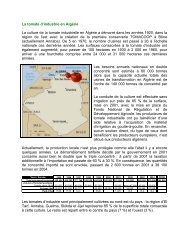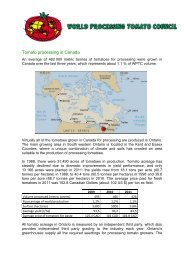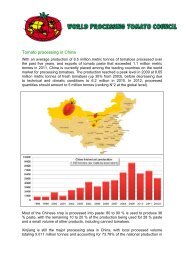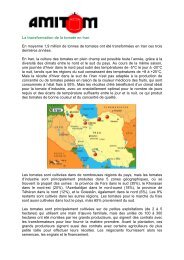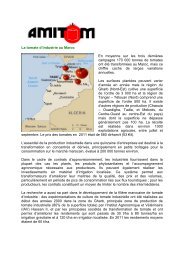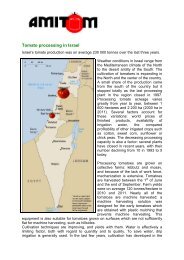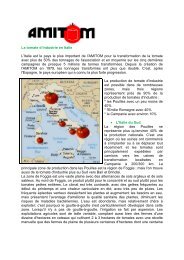- Page 2:
Introduction The European Commissio
- Page 6:
Composition of tomatoes and tomato
- Page 10:
Composition of tomatoes and tomato
- Page 14:
Composition of tomatoes and tomato
- Page 18:
Composition of tomatoes and tomato
- Page 22:
Composition of tomatoes and tomato
- Page 26:
Composition of tomatoes and tomato
- Page 30:
Composition of tomatoes and tomato
- Page 34:
Composition of tomatoes and tomato
- Page 38:
Composition of tomatoes and tomato
- Page 42:
Composition of tomatoes and tomato
- Page 46:
Composition of tomatoes and tomato
- Page 50:
Composition of tomatoes and tomato
- Page 54:
Composition of tomatoes and tomato
- Page 58:
Composition of tomatoes and tomato
- Page 62:
Composition of tomatoes and tomato
- Page 66:
Composition of tomatoes and tomato
- Page 70:
Composition of tomatoes and tomato
- Page 74:
Composition of tomatoes and tomato
- Page 78:
Composition of tomatoes and tomato
- Page 82:
Composition of tomatoes and tomato
- Page 86:
Composition of tomatoes and tomato
- Page 90:
Composition of tomatoes and tomato
- Page 94:
Composition of tomatoes and tomato
- Page 98:
Composition of tomatoes and tomato
- Page 102:
Composition of tomatoes and tomato
- Page 106:
Composition of tomatoes and tomato
- Page 110:
Composition of tomatoes and tomato
- Page 114:
Composition of tomatoes and tomato
- Page 118:
Composition of tomatoes and tomato
- Page 122:
Composition of tomatoes and tomato
- Page 126:
Composition of tomatoes and tomato
- Page 130:
Composition of tomatoes and tomato
- Page 134:
Composition of tomatoes and tomato
- Page 138:
Composition of tomatoes and tomato
- Page 142:
Composition of tomatoes and tomato
- Page 146:
Composition of tomatoes and tomato
- Page 150:
Composition of tomatoes and tomato
- Page 154:
Composition of tomatoes and tomato
- Page 158:
Composition of tomatoes and tomato
- Page 162:
Composition of tomatoes and tomato
- Page 166:
Composition of tomatoes and tomato
- Page 170:
Composition of tomatoes and tomato
- Page 174:
Composition of tomatoes and tomato
- Page 178:
Composition of tomatoes and tomato
- Page 182:
Composition of tomatoes and tomato
- Page 186:
Composition of tomatoes and tomato
- Page 190:
Composition of tomatoes and tomato
- Page 194: Composition of tomatoes and tomato
- Page 198: Composition of tomatoes and tomato
- Page 202: Composition of tomatoes and tomato
- Page 206: Composition of tomatoes and tomato
- Page 210: Composition of tomatoes and tomato
- Page 214: Processing and Bioavailability (WG2
- Page 218: Processing and Bioavailability (WG2
- Page 222: Processing and Bioavailability (WG2
- Page 226: Processing and Bioavailability (WG2
- Page 230: Processing and Bioavailability (WG2
- Page 234: Processing and Bioavailability (WG2
- Page 238: Processing and Bioavailability (WG2
- Page 242: Processing and Bioavailability (WG2
- Page 248: Processing and Bioavailability (WG2
- Page 252: Processing and Bioavailability (WG2
- Page 256: Processing and Bioavailability (WG2
- Page 260: Processing and Bioavailability (WG2
- Page 264: Processing and Bioavailability (WG2
- Page 268: Processing and Bioavailability (WG2
- Page 272: Processing and Bioavailability (WG2
- Page 276: Processing and Bioavailability (WG2
- Page 280: Processing and Bioavailability (WG2
- Page 284: Processing and Bioavailability (WG2
- Page 288: Processing and Bioavailability (WG2
- Page 292: Processing and Bioavailability (WG2
- Page 296:
Processing and Bioavailability (WG2
- Page 300:
Processing and Bioavailability (WG2
- Page 304:
Processing and Bioavailability (WG2
- Page 308:
Processing and Bioavailability (WG2
- Page 312:
Processing and Bioavailability (WG2
- Page 316:
Processing and Bioavailability (WG2
- Page 320:
Processing and Bioavailability (WG2
- Page 324:
Processing and Bioavailability (WG2
- Page 328:
Processing and Bioavailability (WG2
- Page 332:
Processing and Bioavailability (WG2
- Page 336:
Processing and Bioavailability (WG2
- Page 340:
Processing and Bioavailability (WG2
- Page 344:
Processing and Bioavailability (WG2
- Page 348:
Processing and Bioavailability (WG2
- Page 352:
Processing and Bioavailability (WG2
- Page 356:
Processing and Bioavailability (WG2
- Page 360:
Processing and Bioavailability (WG2
- Page 364:
Processing and Bioavailability (WG2
- Page 368:
Processing and Bioavailability (WG2
- Page 372:
The relationship between tomatoes a
- Page 376:
Observational epidemiological surve
- Page 380:
Observational epidemiological surve
- Page 384:
Observational epidemiological surve
- Page 388:
Observational epidemiological surve
- Page 392:
Observational epidemiological surve
- Page 396:
Observational epidemiological surve
- Page 400:
Observational epidemiological surve
- Page 404:
Observational epidemiological surve
- Page 408:
Observational epidemiological surve
- Page 412:
Colon, Rectum Franceschi et al., 19
- Page 416:
Observational epidemiological surve
- Page 420:
Observational epidemiological surve
- Page 424:
Observational epidemiological surve
- Page 428:
Negri et al., 1996-a La Vecchia et
- Page 432:
Observational epidemiological surve
- Page 436:
Observational epidemiological surve
- Page 440:
Observational epidemiological surve
- Page 444:
Observational epidemiological surve
- Page 448:
Observational epidemiological surve
- Page 452:
Observational epidemiological surve
- Page 456:
Observational epidemiological surve
- Page 460:
Observational epidemiological surve
- Page 464:
Observational epidemiological surve
- Page 468:
Observational epidemiological surve
- Page 472:
Observational epidemiological surve
- Page 476:
Observational epidemiological surve
- Page 480:
Observational epidemiological surve
- Page 484:
Klipstein- Grobush et al., (1999) Y
- Page 488:
Observational epidemiological surve
- Page 492:
Observational epidemiological surve
- Page 496:
Observational epidemiological surve
- Page 500:
Observational epidemiological surve
- Page 504:
Observational epidemiological surve
- Page 508:
Table 39 Age related macular degene
- Page 512:
Table 40 Vitamin C and cataract Obs
- Page 516:
Table 41 Vitamin E and cataract Obs
- Page 520:
Observational epidemiological surve
- Page 524:
Observational epidemiological surve
- Page 528:
Observational epidemiological surve
- Page 532:
Observational epidemiological surve
- Page 536:
Observational epidemiological surve
- Page 540:
Observational epidemiological surve
- Page 544:
Observational epidemiological surve
- Page 548:
Observational epidemiological surve
- Page 552:
Observational epidemiological surve
- Page 556:
Observational epidemiological surve
- Page 560:
Mechanisms and Biomarkers (WG 4) pa
- Page 564:
Mechanisms and Biomarkers (WG 4) pa
- Page 568:
Mechanisms and Biomarkers (WG 4) pa
- Page 572:
Mechanisms and Biomarkers (WG 4) pa
- Page 576:
Mechanisms and Biomarkers (WG 4) pa
- Page 580:
Mechanisms and Biomarkers (WG 4) pa
- Page 584:
Mechanisms and Biomarkers (WG 4) pa
- Page 588:
Mechanisms and Biomarkers (WG 4) pa
- Page 592:
Mechanisms and Biomarkers (WG 4) pa
- Page 596:
Mechanisms and Biomarkers (WG 4) pa
- Page 600:
Mechanisms and Biomarkers (WG 4) pa
- Page 604:
Mechanisms and Biomarkers (WG 4) pa
- Page 608:
Mechanisms and Biomarkers (WG 4) pa
- Page 612:
Mechanisms and Biomarkers (WG 4) pa
- Page 616:
Mechanisms and Biomarkers (WG 4) pa
- Page 620:
Mechanisms and Biomarkers (WG 4) pa
- Page 624:
Mechanisms and Biomarkers (WG 4) pa
- Page 628:
Mechanisms and Biomarkers (WG 4) pa
- Page 632:
Mechanisms and Biomarkers (WG 4) pa
- Page 636:
Mechanisms and Biomarkers (WG 4) pa
- Page 640:
Mechanisms and Biomarkers (WG 4) pa
- Page 644:
Mechanisms and Biomarkers (WG 4) pa
- Page 648:
Mechanisms and Biomarkers (WG 4) pa
- Page 652:
Mechanisms and Biomarkers (WG 4) pa
- Page 656:
Mechanisms and Biomarkers (WG 4) pa
- Page 660:
Mechanisms and Biomarkers (WG 4) pa
- Page 664:
Mechanisms and Biomarkers (WG 4) pa
- Page 668:
Mechanisms and Biomarkers (WG 4) pa
- Page 672:
Mechanisms and Biomarkers (WG 4) pa
- Page 676:
Mechanisms and Biomarkers (WG 4) pa
- Page 680:
Mechanisms and Biomarkers (WG 4) pa
- Page 684:
Mechanisms and Biomarkers (WG 4) pa
- Page 688:
Mechanisms and Biomarkers (WG 4) pa
- Page 692:
Mechanisms and Biomarkers (WG 4) pa
- Page 696:
Mechanisms and Biomarkers (WG 4) pa
- Page 700:
Mechanisms and Biomarkers (WG 4) pa
- Page 704:
Mechanisms and Biomarkers (WG 4) pa
- Page 708:
Mechanisms and Biomarkers (WG 4) pa
- Page 712:
Mechanisms and Biomarkers (WG 4) pa
- Page 716:
Mechanisms and Biomarkers (WG 4) pa



